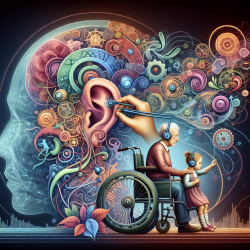Introduction: The Power of Technology in Mental Health Training
In a world where mental health resources are often scarce, especially in low- and middle-income countries (LMICs), innovative solutions are crucial. The recent study titled "Using technology to scale-up training and supervision of community health workers in the psychosocial management of perinatal depression: a non-inferiority, randomized controlled trial" offers a promising approach. This research highlights the potential of technology-assisted training to deliver effective mental health interventions without the need for specialist-led face-to-face supervision.
Key Findings: Technology vs. Traditional Training
The study conducted in District Swat, Pakistan, compared the Technology-Assisted Cascaded Training and Supervision (TACTS) system with conventional face-to-face training. The results were compelling:
- No significant difference in competence levels between health workers trained via TACTS and those trained face-to-face.
- Competence scores improved over time with both methods, indicating the importance of experiential learning and supportive supervision.
- TACTS was approximately 30% less expensive than traditional training methods.
These findings suggest that technology-assisted training can be a viable alternative to traditional methods, especially in resource-poor settings.
Implications for Practitioners
For practitioners in the field of mental health, these results are encouraging. Implementing technology-assisted training can lead to several benefits:
- Cost-Effectiveness: Reducing training costs by 30% can free up resources for other essential services.
- Scalability: With technology, training can be scaled up to reach more community health workers, even in remote areas.
- Accessibility: Offline applications like TACTS ensure that training is accessible without the need for a stable internet connection.
By adopting such technology-driven approaches, practitioners can enhance their service delivery and reach a larger population in need of mental health support.
Encouraging Further Research
While the study provides valuable insights, it also opens avenues for further research. Future studies could explore:
- The long-term impact of technology-assisted training on health worker competence and patient outcomes.
- Adaptations of the TACTS model for other mental health interventions beyond perinatal depression.
- The potential of integrating such technology with existing healthcare systems for broader application.
Engaging in further research will help refine these methods and ensure their effectiveness across different contexts and populations.
Conclusion: A New Era in Mental Health Training
The integration of technology in training community health workers represents a significant step forward in addressing mental health challenges in LMICs. By leveraging digital tools, we can overcome barriers related to cost, accessibility, and scalability. As practitioners, embracing these innovations will not only enhance our capabilities but also improve the lives of those we serve.
To read the original research paper, please follow this link: Using technology to scale-up training and supervision of community health workers in the psychosocial management of perinatal depression: a non-inferiority, randomized controlled trial.










